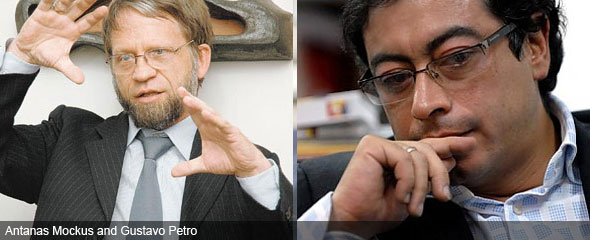
Colombian political parties Polo Democratico and the Greens will evaluate an “agreement of cooperation” between the two collectives for the second round elections on June 20.
Both parties will examine a revised five point proposal laid on the table by Polo Democratico’s former presidential candidate Gustavo Petro during a meeting with Green presidential candidate Antanas Mockus on Thursday night.
According to Petro, the agreement does not propose “a fusion; it’s not a bureaucratic agreement, it’s not a coalition, it’s a cooperation whose objective is to bring together the nation.”
Petro said that in the event that Mockus wins the second round election, Polo Democratico will not take part in his government but would rather cooperate “to save Colombia from the aberrant social inequality” in which exists in the Andean nation.
“There is a principle of cooperation … 17 days of collaboration,” Mockus commented regarding the proposal.
“Polo is not interested in a victory of the rival candidate [Partido de la U’s Juan Manuel Santos]… and we reorganized Polo’s proposal and developed a new draft that will be evaluated by each of the teams,” Mockus said.
“There are no democratic commitments nor announcements of future alliances,” Mockus stated.
“The two parties will work to bring together the abstainers who are not in favor of the current government … we want to invite them to recognize their power to contribute to small and big decisions so that they feel the responsibility to vote,” Mockus said.
Political analyst Andres Molano expressed doubt that the two parties would reach an agreement. “The Greens and Polo have key proposals that are irreconcilable. They regard important economic themes and the way, for example, they conceive of relations with the U.S.,” Molano said.
There are those within Polo Democratico who are critical of Mockus and view him as “more right than left” Molano explained.
Sandra Borda, a professor at the Universidad de los Andes said that “Antanas Mockus and the Green Party would be thinking that they have the best of both worlds: Polo’s voters, but without political commitment.”
Due to “their nature and their philosophy on how to handle politics, the Green Party is not going to build coalitions the way Juan Manuel Santos is building them,” Borda said.
Santos has secured support from the Conservative Party and has invited the Liberals to form a coalition with his potential government.
Polo Democratico in an open letter to Mockus proposed “initiating a process of public and transparent dialogue” based on five key points. Mockus verbally accepted three and the ball remains in the Greens’ court.
Mockus won 21.47% of the vote in last Sunday’s first round presidential elections. Petro, with 9.16%, came in fourth and is now out of the running. Because the Partido de la U candidate Santos won the round with 46.57% of the vote, the Green Party must form an alliance if they have any chance of winning the second round runoff with Santos on Sunday June 20.

